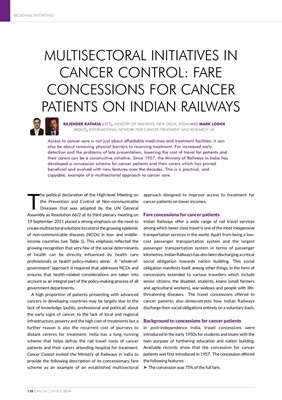
REGIONAL INITIATIVES
CANCER CONTROL 2014 139
Table 1: Excerpts from the Annex Political Declaration of the High-level Meeting of the General Assembly on the Prevention and Control of
Non-communicable Diseases, Resolution 66/2 adopted by the General Assembly at its third plenary meeting, 19 September 2011
Responding to the challenge: A whole-of-government and a whole-of-society effort
33 Recognize that the rising prevalence, morbidity and mortality of non-communicable diseases worldwide can be largely
prevented and controlled through collective and multisectoral action by all Member States and other relevant stakeholders
at the local, national, regional and global levels, and by raising the priority accorded to non-communicable diseases in
development cooperation by enhancing such cooperation in this regard
36 Recognize that effective non-communicable disease prevention and control require leadership and multisectoral
approaches for health at the government level, including, as appropriate, health in all policies and whole-of-government
approaches across such sectors as health, education, energy, agriculture, sports, transport, communication, urban planning,
environment, labour, employment, industry and trade, finance, and social and economic development
39 Recognize that the incidence and impacts of non-communicable diseases can be largely prevented or reduced with an
approach that incorporates evidence-based, affordable, cost-effective, population-wide and multisectoral interventions
42 Acknowledge the need to put forward a multisectoral approach for health at all government levels, to address noncommunicable disease risk factors and underlying determinants of health comprehensively
and decisively
Reduce risk factors and create health-promoting environments
43. Advance the implementation of multisectoral, cost-effective, population-wide interventions in order to reduce the impact of
the common non-communicable disease risk factors
43(a) Encourage the development of multisectoral public policies that create equitable health-promoting environments that
empower individuals, families and communities to make healthy choices and lead healthy lives
43(b) Develop, strengthen and implement, as appropriate, multisectoral public policies and action plans to promote health
education and health literacy, including through evidence-based education and information strategies and programmes in
and out of schools and through public awareness campaigns, as important factors in furthering the prevention and control of
non-communicable diseases, recognizing that a strong focus on health literacy is at an early stage in many countries
43(l) Scale up, where appropriate, a package of proven, effective interventions, such as health promotion and primary prevention
approaches, and galvanize actions for the prevention and control of non-communicable diseases through a meaningful
multisectoral response, addressing risk factors and determinants of health
Strengthen national policies and health systems
45 Promote, establish or support and strengthen, by 2013, as appropriate, multisectoral national policies and plans for the
prevention and control of non-communicable diseases, taking into account, as appropriate, the 2008-2013 Action Plan for
the Global Strategy for the Prevention and Control of Non-communicable Diseases and the objectives contained therein,
and take steps to implement such policies and plans
45(f) Promote multisectoral and multi-stakeholder engagement in order to reverse, stop and decrease the rising trends of obesity
in child, youth and adult populations, respectively
Research and development
61 Call upon the World Health Organization, with the full participation of Member States, informed by their national situations,
through its existing structures, and in collaboration with United Nations agencies, funds and programmes and other relevant
regional and international organizations, as appropriate, building on continuing efforts to develop, before the end of 2012, a
comprehensive global monitoring framework, including a set of indicators, capable of application across regional and country
settings, including through multisectoral approaches, to monitor trends and to assess progress made in the implementation of
national strategies and plans on non-communicable diseases.
Follow-up
64. Request the Secretary-General, in close collaboration with the Director-General of the World Health Organization, and in
consultation with Member States, United Nations funds and programmes and other relevant international organizations, to
submit by the end of 2012 to the General Assembly, at its sixty-seventh session, for consideration by Member States,
options for strengthening and facilitating multisectoral action for the prevention and control of non-communicable diseases
through effective partnership
65 Request the Secretary-General, in collaboration with Member States, the World Health Organization and relevant funds,
programmes and specialized agencies of the United Nations system to present to the General Assembly at its sixty-eighth
session a report on the progress achieved in realizing the commitments made in this Political Declaration, including on the
progress of multisectoral action, and the impact on the achievement of the internationally agreed-development goals,
including the Millennium Development Goals, in preparation for a comprehensive review and assessment in 2014 of the
progress achieved in the prevention and control of non-communicable diseases